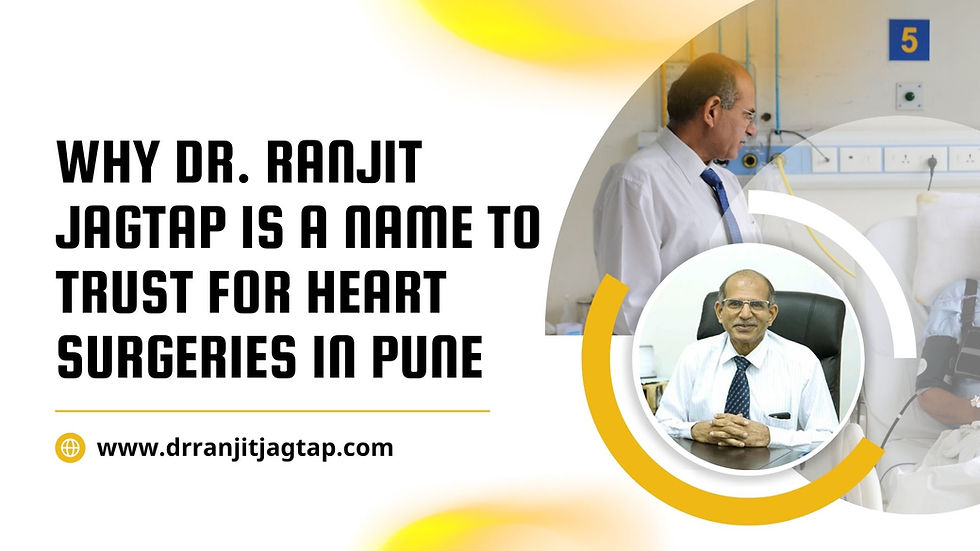What You Need To Know About Cardiac Surgery: Myths and Facts
- drranjitjagdap
- Jul 21, 2022
- 3 min read
The person who has been advised to undergo cardiac surgery is likely to be faced with a multitude of questions, queries, and concerns. Patients often contact their doctors with concerns, facts, assumptions and figures in order to determine whether heart surgery is necessary or if it can be delayed or cancelled. Generally, people start to speculate about the operations and fall into the trap of making assumptions.
In today's digital age, misinformation thrives on every platform in an effort to make people aware of harmful information that could potentially pose a threat to their health. Therefore, you should not rely on everything you read and hear unless your physician confirms them.
Here are some common myths and facts about heart surgery.
It is true that times are uncertain, but facts aren't. For boosting your heart health, it is imperative that we distinguish between facts and fiction. Here are some common myths and facts about cardiothoracic surgeons and surgeries. It is important to dispel the myths as they are unfounded on the scale of scientific knowledge:
Myth 1: Cardiac surgery should be regarded as the last resort of treatment.
Fact: A prompt diagnosis is one of the most important facts related to heart surgery. Once you are diagnosed with heart disease, preventing surgical treatment can cause irreparable damage.
Therefore, it is essential to undergo cardiac surgery according to the doctor's recommendations to achieve the best results. A timely cardiac surgery reduces the risk of permanent health damage, which can also be fatal. Thus, deciding to undergo cardiac surgery as a last resort may put your life in danger.
Myth 2: Surgery is performed by removing the heart from the body.
Fact: It is a common misconception that the heart is removed from the body during surgery. While heart transplantation is actually a surgery that removes the heart from the body.
Open heart surgery is a surgical procedure in which only an incision is made and the surgery takes place.
Myth 3: Surgery will cause heart stroke or interfere with the brain's function
Fact: Surgical interventions have improved drastically since modern technology and updated medical practices have been embraced. Cardiac surgeries often result in postoperative complications, but heart strokes and improper brain functioning are uncommon. It is, however, essential that the patient discusses his medical condition before the surgery in order to eliminate any prevailing risks.
Myth 4: Cardiac surgery is excruciating
The surgical procedure for cardiac surgery is performed once the patient is fully asleep and numb with anaesthesia. As well, the anaesthetist remains in the operating room during surgery to increase the anaesthesia dose as necessary.
Myth 5: Robotic surgery is more effective
Fact: There is no conclusive evidence that robotic surgery is better for the heart than traditional surgery. It depends entirely on the medical condition of the patient undergoing treatment. One should be aware that robotic surgery can wipe out a large portion of their savings before deciding to undergo it. Although it has its own set of benefits, there are the same risks and success rates as with other cardiac surgeries.
Myth 6: The physical activity of patients after cardiac surgery is completely restricted.
Fact: Total restriction of physical activity of the patient is false. It is possible for patients to resume their routine lifestyle within 3-4 weeks of the operation while some dietary restrictions are in place.
One of the famous heart surgeon Dr Ranjit Jagtap recommends that you exercise more often so you can remain healthy. Dr Ranjit Jagtap can recommend that patients go swimming, jogging, or running after surgery.
Myth 7: Cardiac surgery is extremely risky
Fact: Valve replacement surgery and bypass surgery are relatively risk-free with modern medical technology. 98% or more of operations are successful when performed at the right time.

The Bottom Line
Surgery is a complex procedure that comes with its own set of risks, challenges, and rewards. Making assumptions or believing anything said may put your heart health at risk. If you have heart disease or a loved one does, consider what an expert doctor like Dr Ranjit Jagtap recommends and not what others recommend.
Most studies have found how cardiac surgery benefits patients. They supersede medications and non-surgical heart treatments by giving long healthy lives and saving you from paying a considerable amount of unnecessary medical expenses.
An expert in performing cardiac surgeries with high success rates, Dr Ranjit Jagtap Clinic has years of experience and enormous contributions to cardiac healthcare.
Heart problems are our specialty, so they offer the best optimal solutions and guidance with regard to them. We work hard to provide the best health care facility rather than meet the needs of business.





Comments